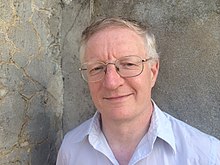Timothy Williamson
Timothy Williamson (born August 6, 1955 in Uppsala ) is an English philosopher and Wykeham professor of logic at Oxford University . His theses on metaphilosophy , epistemology , philosophy of mind and metaphysics have been widely discussed in recent philosophical debates.
Life
Williamson studied mathematics and philosophy in Oxford and graduated there in 1981. From 1980 to 1988 he was a lecturer at Trinity College Dublin , then a lecturer and fellow at University College Oxford . From 1995 to 2000 he was Professor of Logic and Metaphysics at the University of Edinburgh until he finally returned to Oxford, where he became Wykeham Professor of Logic and Fellow at New College .
From 2004 to 2005, Williamson was President of the Aristotelian Society . He has been a member of the American Academy of Arts and Sciences since 2007 . He is an external member of the Norwegian Academy of Sciences and has been a full member of the Academia Europaea since 2013 . In 2014 he became an honorary member of the Royal Irish Academy .
Central theses
In his 1994 textbook on blurring , Williamson advocates epistemicism . Vagueness describes the situation where no clear line can be drawn when trying to analyze a term. However, that this is the case, Williamson said, does not mean that there is no limit. Rather, even with phenomena such as color perception, we are only able to determine that there is a difference when there are major differences between two color tones (although a difference can always be physically measured).
In his book on epistemology, Williamson tries to show that the concept of knowledge is impossible to analyze. The reason for the failure of all attempts at this analysis lies in the fact that an analysis of “knowledge” must always be a conjunction of concepts, such as “ true justified opinion ”. But since knowledge is a mental concept (referring to a subject), but the analysis concepts are non-mental, every analysis with these tools must be different from the actual concept of knowledge due to its non-individual character. It is a false expectation to assume that the concept of knowledge can be described by a sharp, non-trivial analysis. Rather, “knowledge” is already the most general factual (i.e., truth-implicating) description of an attitude towards a statement that someone can have if he has an attitude towards this statement at all.
In his metaphilosophical book The Philosophy of Philosophy , Williamson outlines a philosophy of science . Although this, unlike other sciences, does not obtain empirical data, but rather takes place in the “armchair”, it is able to produce answers to relevant problems. This is not due to the ingenious creative power of the philosophers, but is possible with the help of the analysis of everyday skills and abilities. As an example, he cites the intuitions and evaluations that we can reliably develop for counterfactual conditionalities .
Publications (selection)
- Identity and Discrimination. Oxford 1990.
- Vagueness. London 1994.
- Knowledge and its limits. Oxford 2000.
- The Philosophy of Philosophy. Oxford 2007.
- Modal Logic as Metaphysics. Oxford 2013
Web links
- Homepage Timothy Williamson at Oxford University (English)
Individual evidence
- ↑ Book of Members 1780 – present, Chapter W. (PDF; 852 kB) In: American Academy of Arts and Sciences (amacad.org). Retrieved January 12, 2018 .
- ^ Membership directory: Timothy Williamson. Academia Europaea, accessed January 12, 2018 .
- ^ Members: Timothy Williamson. Royal Irish Academy, accessed May 14, 2019 .
| personal data | |
|---|---|
| SURNAME | Williamson, Timothy |
| BRIEF DESCRIPTION | English philosopher |
| DATE OF BIRTH | August 6, 1955 |
| PLACE OF BIRTH | Uppsala |
